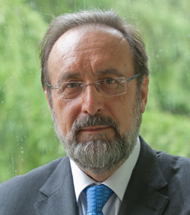"At birth we have only 26% of the Issue that our brains will reach in adulthood."
Daniel Turbón, Full Professor and member of the Royal European Academy of Doctors, will give a lecture on Evolution at the University of Navarra ( seminar ).

PHOTO: Manuel Castells
As explained by the Full Professor of Anthropology of the University of Barcelona during a seminar on Evolution that he offers annually to the students of the School of Sciences of the University of Navarra, "at the moment of birth our brain has only 26% of the Issue total that it will reach in adulthood".
As he indicated to the students of the Degrees Biology and Biochemistry , human evolution implied adaptations in Homo sapiens that explain from the size of our brain, to the existence of phases such as "second childhood" or adolescence, which do not exist in any other primate: "In fact, these phases are defined in our genes because they have a biological sense, a sense in our adaptation and evolution as a species. And the same is true for the size of the brain, which got bigger and bigger from Homo erectus to Homo sapiens". However, "the brain is initially small to facilitate childbirth, which also shows an adaptation of the species to eliminate problems in reproduction".
The expert also detailed how humans "are the only primate species that is parental -both the male and female act as models for the offspring in common-. Chimpanzees, on the other hand, are matrifocal: females are exclusively responsible for breeding and represent the only model for their offspring".
"Adolescence is in our genes."Once the offspring are weaned - because there may be a new offspring - the way to make up for their immaturity is by development speech: "Humans need our progenitors to survive and feed us. Teething, for example, is not the final because feeding in this period must also be adapted to immature digestive and immune systems. Speech helps us to understand and learn what we should eat and what dangers we should avoid. It is precisely this phase, in which language develops, that is known as "second childhood". Then comes the juvenile phase: "We do share this stage with many other social mammals and it lasts from 7 to 12 years of age, when we learn to live in society.
Adolescence is the other period unique to man that is defined in our genes: "The great hormonal revolution of this phase of growth and development is also result of our evolution as a species", stresses the scientist and popularizer. In this sense, the expert told the students how Darwin in his second book ("The Origin of Man") dared to describe that many of the traits of our species "were the result of the greater success of the individuals that carried these traits when it came to reproducing".
However, the prestigious scientist -one of only 89 Spanish doctors who are members of the European Academy of Doctors- also reminded that Biology is one thing and Culture is another: "The accumulated information or learning that we have developed as a species is an exclusive result of human beings and of each of the cultures that have followed one another throughout history".
